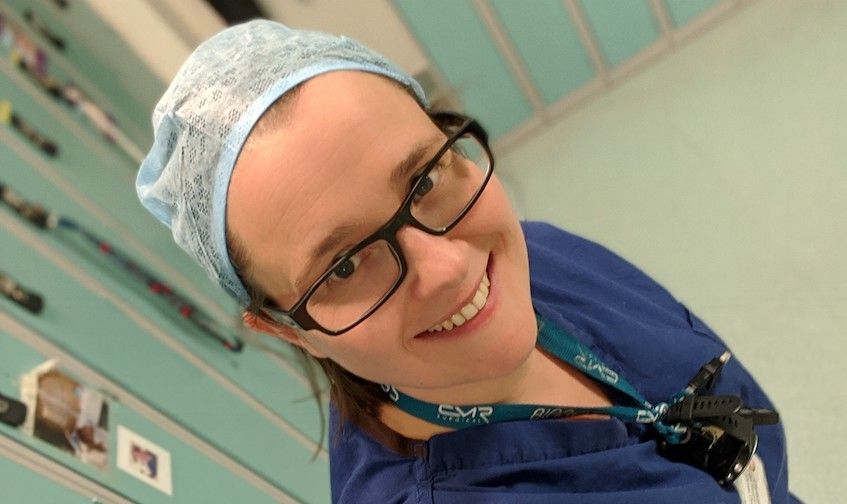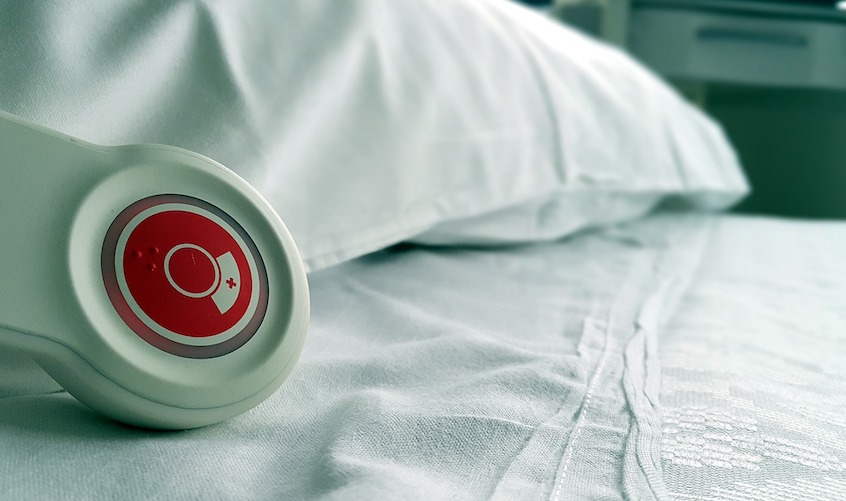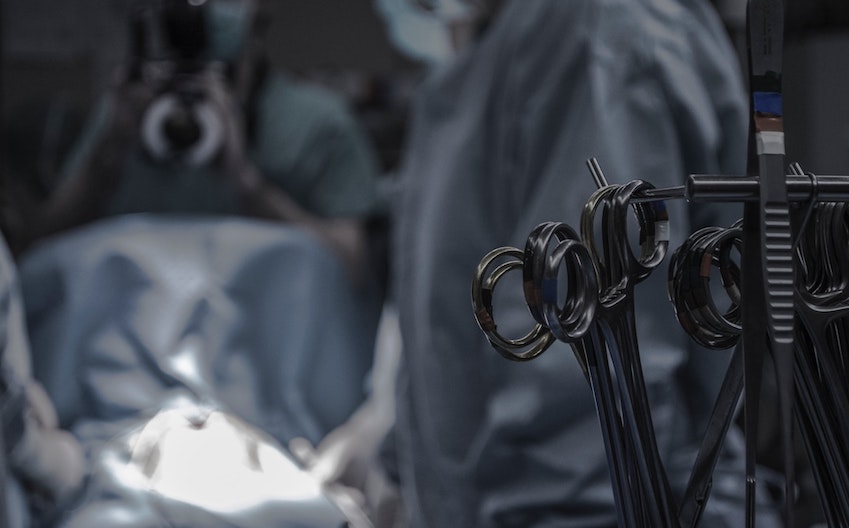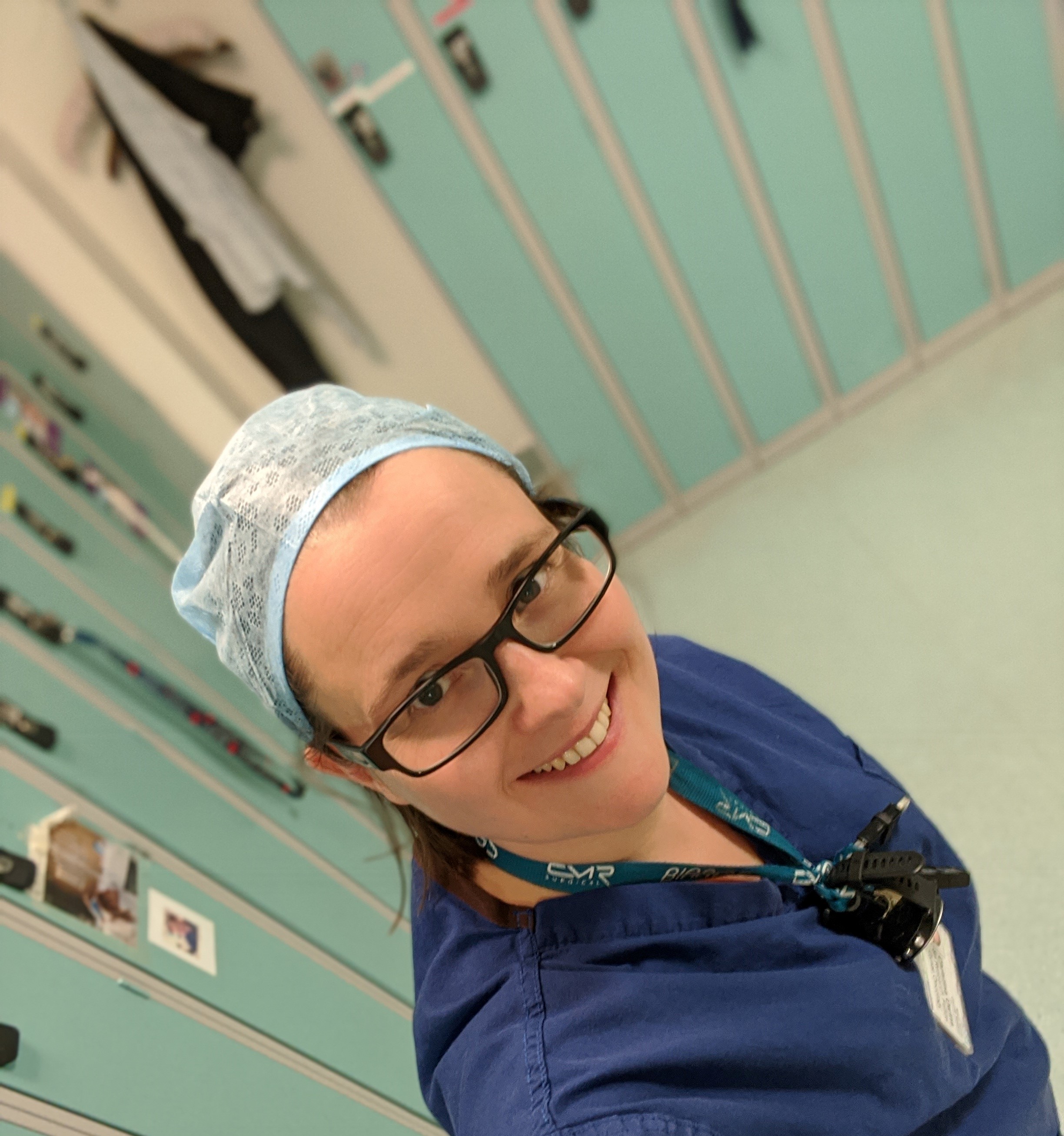


A Jersey-born gynaecological cancer surgeon is leading the way for new ovarian cancer treatments thanks to her study into robotic keyhole surgery.
Over the last three years, Dr Christina Uwins has been exploring whether robotic surgery for ovarian cancer improves patients’ quality of life and recovery time.
Christina’s research, which is the ‘brainchild’ of her consultant supervisor Dr Simon Butler-Manuel, is part of her postgraduate Doctor of Medicine degree at the University of Surrey.
Alongside Simon, who is one of the UK’s leading ‘minimal access’ gynaecological surgeons, Christina has been carrying out clinical trials to see whether robotic surgery has a role in ovarian cancer treatment in future.

Pictured: Dr Christina Uwins is currently undertaking a postdoctoral research degree at the University of Surrey.
As a Senior Clinical Research Fellow in Robotic Gynaecological Oncology, Christina is based at the Royal Surrey County Hospital, one of the only single site NHS Trusts in the UK to have four cutting-edge robots.
“Most centres in the UK are lucky if they have one,” Christina said.
Christina spoke to Express about her research and the importance of knowing the symptoms of ovarian cancer….
Ovarian cancer is the eighth most common cancer in women worldwide. In Jersey, approximately one woman is diagnosed with ovarian cancer every month, but it is estimated that 90% of women are unaware of the symptoms.
As a result, ovarian cancer is often detected late. “Sadly over 70% of women are diagnosed at advanced stages,” Christina explains.
“We have a generation of women who are strong, resilient and just get on with it. It takes a lot for them to realise something is wrong and to see their doctor.”

Pictured: "If you're an older woman who suddenly starts to have urinary tract infections, and doesn't have a history of infections, that should ring alarm bells."
By this point, the cancer will have spread to the abdomen or other parts of the body, making it more difficult to treat.
“One of my patients described it as like blowing a dandelion clock,” Christina said. “It’s the best analogy I’ve heard. You get these little droplets all over your abdomen.”
Treatment for ovarian cancer usually involves a combination of surgery and chemotherapy. In surgery, doctors will make a cut up and down the abdomen, known as open surgery or a laparotomy.
Christina explains that in the UK, almost half of patients aged 70–79 do not have surgery to treat their ovarian cancer, despite it offering the best long-term prognosis for the disease.
“It isn’t acceptable,” Christina said. “Particularly if you look at the population in Surrey or in Jersey where you have a very fit elderly population.”

Pictured: Following open surgery, patients require at least six nights in hospital for recovery.
Part of the reason is that open surgery is risky.
“It’s massive surgery,” Christina said. “We have an average of 4 to 5 hours for these surgeries but they can last 12 hours. That is a lot to put somebody through.”
If you can instead perform laparoscopic surgery (also known as keyhole surgery), which involves much smaller incisions and can result in shorter recovery times, that’s “got to be a win” in Christina’s eyes.
Typically, following robotic surgery, patients require just one or two nights in hospital, compared to at least six nights following open surgery.
Despite the benefits of keyhole surgery, it is not routinely used for ovarian cancer treatment.
“Surgery involves standing next to a patient with your arms lifted for hours on end,” Christina said. “For the sort of surgeries we are performing, I would never want to do traditional keyhole because it is very, very demanding.”
That’s where robotic surgery comes in, where a doctor performs that same surgery but using machines (or robots) to help.

Pictured: The recovery time after keyhole surgery is shorter than that of traditional surgery.
“Robotics provide a more relaxed position to operate,” she said. “It provides tremor control and much finer movement than you can produce laparoscopically.”
The idea behind Christina’s research is to see whether robotic surgery has a role in treating advanced ovarian cancer in the future.
For the last three years, Christina has been running her MIRRORS study, which is funded by cancer charity GRACE and the National Institute for Health and Care Research.
For her initial ‘feasibility’ study, Christina ran clinical trials to assess whether robotic surgery is an option that women like and would consider for their treatment.
The study was available to women who had chemotherapy prior to surgery, with a growth (or pelvic mass) of 8 cm or less.
The response to the trial was overwhelmingly supportive.
“Normally if you’re offering a surgical trial you would be happy if 25% of people agree to join the trial.
“Out of everyone we asked to join the trial, only one person declined. So it’s clearly something that patients are keen to consider.”

Pictured: Christina said she had an "amazing, dedciated group of women" supporting the study.
Of the 23 patients involved in the study, 20 of them received robotic surgery.
“At any point that we felt it was more appropriate to do the surgery open, then we would convert,” Christina explained.
“We know that keyhole surgery is less risky in terms of blood loss, and post-operative infections. What we don’t know is whether doing this surgery in this way is better from a cancer point of view.”
The next stage of Christina’s research will be to run a randomised control trial to assess whether the survival rate of this surgery is equivalent to standard open surgery .
“What we hope is that survival is as good as, and not inferior to, the standard surgery, and it has the benefits of quality of life. Clearly we would love it if it was even better.”
A multi-centre, international randomised control trial could take five years to recruit (it would involve 600-700 patients) and another five years to gather the data.
She highlights that robotic keyhole won’t be the form of surgery for everybody, but says that “people at the most advanced stages, and who are the frailest, have the most to benefit from it”.
With regards to robotic surgery though, Christina said: “It’s the way things are going, it’s just a question of time.”
Comments
Comments on this story express the views of the commentator only, not Bailiwick Publishing. We are unable to guarantee the accuracy of any of those comments.